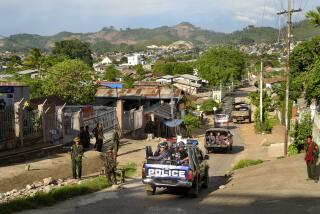Bosnian Troops Capture Rebel Positions
- Share via
ZAGREB, Croatia — After nearly a week of renewed fighting in Bosnia-Herzegovina, government forces appear to have gained control of two mountaintop communication towers vital to rebel Serbs, the United Nations reported Saturday.
The government advances were described as the most significant since an offensive in October captured large stretches of territory in the Bihac region of northwest Bosnia, gains that were later lost in a fierce counterattack by the Serbs.
“It seems the Bosnian forces were successful with their offensive against the Bosnian Serbs and have pushed the confrontation line away at least three kilometers (two miles),” U.N. spokesman Alexander Ivanko said of battles in the Majevica hills of northeast Bosnia. “It seems they have struck a severe blow to the command-and-control capabilities of the Bosnian Serb army.”
U.N. military officials said the communication towers--one in the Majevica hills and one in central Bosnia on Mt. Vlasic--may have been dismantled or made inoperable by the Bosnian Serbs before the government troops’ advance.
Telephone lines were cut and some radio and television transmissions were down in Bosnian Serb territory, but a U.N. military official said the rebel army probably has a fallback system for essential military communications.
The United Nations has been unable to provide casualty counts from the renewed fighting because the warring sides have clamped down on the movement of its observers and peacekeepers.
“We suspect the casualties are high because of the intensity of the fighting, but we believe they are being taken to field hospitals, which we can’t get to,” Ivanko said.
In a statement Saturday to a Bosnian Serb news agency, rebel leader Radovan Karadzic reportedly made a “last call” for “immediate direct talks on peace, with cessation of all offensives.”
Karadzic called on the warring sides to return to the battle lines of last December, when former President Jimmy Carter helped broker a cease-fire that was later broadened into a four-month truce. With the fighting this past week, hopes of extending the truce beyond its April 30 expiration have been shattered.
The peace appeal came just a day after Bosnian Serb television broadcast Karadzic, dressed in combat fatigues, touring a town near the most fierce fighting in the Majevica hills. Karadzic reportedly vowed to fight on, saying “there is no more truce.”
“The whole nation will put on uniforms if necessary,” he threatened.
And hours after Karadzic called for peace talks Saturday, Serbian gunners appeared to belie his initiative by launching fierce artillery attacks on government-held towns. The fighting was the worst since the Carter-brokered truce took effect Jan. 1.
The capital, Sarajevo, experienced the most intense artillery and small-arms exchanges in recent months.
Serbian attacks on the Muslim eastern section of Mostar in southwest Bosnia killed a child and wounded six other civilians, U.N. officials said. And a heavy artillery attack on the eastern town of Gorazde left several people dead and wounded, prompting NATO jets to fly over the city in a show of force, Bosnian television reported.
Bosnian TV also reported Serbian shelling of several other government-held cities and towns, including Velika Kladusa in the northwest and Gracanica and Tuzla in north-central Bosnia.
The Bosnian government has insisted that it will not talk with Karadzic until he accepts the Contact Group peace plan reluctantly approved by the government last year. The plan--offered by the United States, Britain, France, Germany and Russia--would partition the country roughly in half.
It has been repeatedly rejected by the rebel Serbs.
Western diplomats and military analysts said that Karadzic, who is known for his unpredictable antics, would prefer to freeze territorial gains made over the last three years. In that sense, his latest peace bid offered nothing new.
The Bosnian Serbs control 70% of Bosnia, giving them a strong bargaining position for a negotiated settlement.
More to Read
Sign up for Essential California
The most important California stories and recommendations in your inbox every morning.
You may occasionally receive promotional content from the Los Angeles Times.













